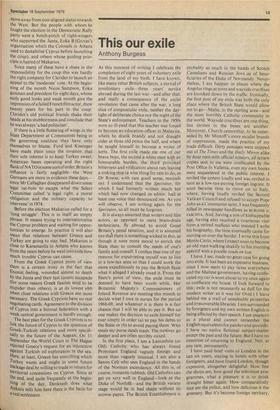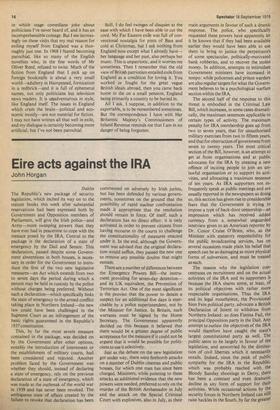This our exile
Anthony Burgess At this moment of writing I celebrate the completion of eight years of voluntary exile from the land of my birth. I have known, like many other British subjects, a period of involuntary exile—three years' service abroad during the last war—and after that, and really a consequence of the social revolution that came after the war, a long slice of crespuscular exile, neither the daylight of deliberate choice nor the night of the State's enforcement. Teachers in the 1950s were so ill-paid that this teacher was forced to become an education officer in Malaysia, where he drank brandy and not draught cider at three old pence the half, and where he taught himself to become a writer of sorts. The first exile made me one of our brave boys, the second a white man with an honourable burden, the • third provOked bitterness and vilification about rats leaving a sinking ship (a wise thing for rats to do, as Dr Rowse, with rare good sense, reminds us). I understand that the Spectator, for which 1 had formerly written much but which had now changed its editor, had at least one voice that denounced me. As you will observe, 1 am writing again for the Spectator, so all must be forgiven.
It is always assumed that writers and film actors,. as opposed to mere brain-drain technicians, fly abroad to avoid Great Britain's penal taxation, and it is assumed too thal there is something wicked in this, as though it were more moral to enrich the State than to consult the needs of one's family and oneself. I confess that one of my reasons for expatriating myself was to live in a low-tax area so that I could work the more expeditiously to pay the British State what it alleged I already owed it. From the State's point of view, the exile must be deemed to have been worth while. Her Britannic Majesty's Commissioners of Inland Revenue are meeting this month to decide what I owe in surtax for the period 1968-69, and whatever it is there is a fair chance that I will be able to pay it. But no one makes the decision to exile himself for ever simply in order (a) to pay his debts to the State or (b) to avoid paying them. Who steals my purse steals trash. The motives go deeper and are often terribly mixed.
In the first place, 1 am a Lancashire (or Old) Catholic who has always found Protestant England vaguely foreign and more than vaguely inimical. I am also a Saxon Celt who sees England in the hands of the Norman ascendancy. All this is, of .course, romantic rubbish. Old Catholics can get on very well in England—look at the Duke of Norfolk—and the British variety stage would be in bad shape without its scowse papes. The British Establishment is probably as much in the hands of Scotch Canadians and Russian Jews as of beneficiaries of the Duke of Normandy. Nevertheless, I am happier in places where the Angelus rings at noon and wayside crucifixes are knocked down by the traffic. Ironically, the first post of my exile was both the only place where the British State would allow me to go—Malta, in the sterling area—and the most horribly Catholic community in the world. Wayside crucifixes are one thing, but shrines in the buses are another. Moreover, Church censorship, to be superseded by Mr Mintoff's more secular brands of suppression, made the practice of my trade difficult. Dirty passages were snipped out of The Times and the Daily Mirror alike by dour men with official scissors, all review copies sent to me were confiscated by the Post Office in Valletta, even my own books were sequestered in the public interest. reviled the system loudly and was reviled in turn as a low-tax-paying foreign ingrate. It soon became time to move on to Italy, where, . having loudly reviled the Second Vatican Council and refused to accept Pope John as a Communist saint, I was frequently billed in newspaper headlines as BURGESS IL FASCISTA. And, having a son of kidnappable age, having also received a courteous visit from a retired mafioso who insisted I write his biography, the time eventually came for moving on over the border. I write thisfrom Monte Carlo, where [expect soon to become an old man walking shakily to his morning aperitif with a poodle tondu en lion.
I have, 1 see, made no great case for going into exile. It has been an expensive business, since I now seem to pay taxes everywhere and the Maltese government, having confiscated my car is soon about to try once again to confiscate my house. (I look forward to this; exile is not necessarily as dull for the modern writer as it was for Ovid.) I leave behind me a trail of unsaleable properties and irrecoverable libraries. 1 am surrounded by foreigners and my own written English is being affected by their speech. I use spaghetti as a plural and cannot remember the English equivalents for guichet and sportello. I have no native fictional subject-matter except the past and the future. But I have no intention of returning to England. Not, at any rate, permanently.
have paid brief visits to London in the last six years, staying in hotels with other foreigners, and have found London, though expensive, altogether delightful. How fine the shops are, how good the television programmes, what a pleasure it is to drink draught bitter again. How comparatively nice are the police, and how delicious is the greenery. But it's become foreign territory. in which stage comedians joke about politicians I've never heard of, and it has an incomprehensible coinage. But I see increasingly on these visits that my real reason for exiling myself from England was a thoroughly just one. In 1968 I feared becoming parochial, like so many of the English novelists who, in the fine words of Mr Oliver Reed, refused to swiss. Much of the fiction from England that I pick up on foreign bookstalls is about a very small world—adultery in Hampstead, fornication in a redbrick—and it is full of ephemeral names, not only politicians but television news readers. It is unadventurous in style, like England itself. The issues in England which cram the brain—political and economic mostly—are not material for fiction. I may not have written all that well in exile, and my dialogue is certainly becoming more artificial, but I've not been parochial. Still. I do feel twinges of disquiet at the ease with which I have been able to cut the cord. My Far Eastern exile was full of conventional nostalgia for pints of Bass and cold at Christmas, but I ask nothing from England now except what I already have-her language and her past, also perhaps her music. This is unpatriotic, and it worries me sometimes. Then I remember that the old view of British patriotism entailed exile from England as a condition for loving it. You worked or fought for the great vague British ideals abroad, then you came back home to die on a small pension, England being primarily a country to be buried in.
All I ask, I suppose, in addition to the exportable, is to be remembered sometimes. But the correspondence I have with Her Britannic Majesty's Commissioners of Inland Revenue reminds me that I am in no danger of being forgotten.






































 Previous page
Previous page